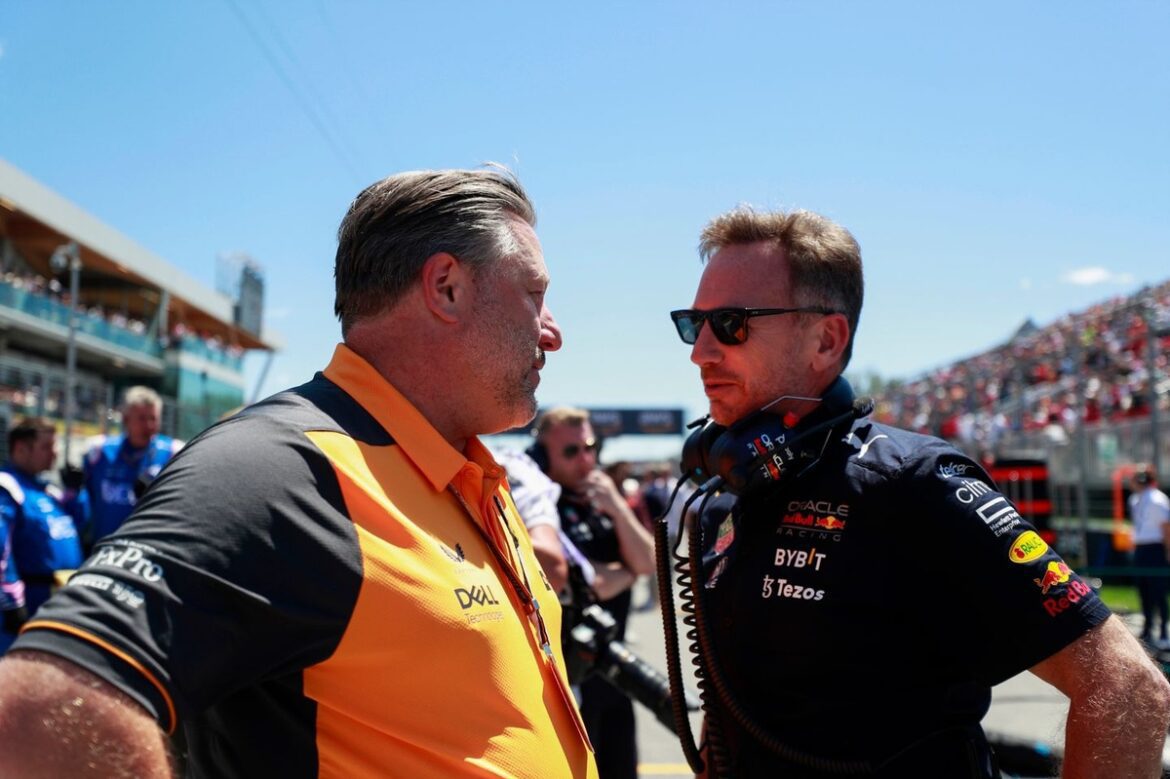Speculations Surround Christian Horner’s Possible Return to Formula 1
The world of Formula 1 is always buzzing with rumors and speculations, especially when it comes to team management and leadership changes. Recently, Zak Brown, the CEO of McLaren Racing, weighed in on the ongoing speculation regarding Christian Horner, the former team principal of Red Bull Racing. This conversation comes at a time when the motorsport community is keenly observing the dynamics within various teams and the potential for shifts in leadership roles as the sport evolves.
Background on Christian Horner and His Tenure at Red Bull Racing
Christian Horner’s career in Formula 1 has been nothing short of remarkable. He joined Red Bull Racing in 2005, and under his leadership, the team experienced unprecedented success, clinching multiple Constructors’ and Drivers’ Championships. His innovative strategies and ability to manage some of the sport’s top talents have solidified his reputation as one of the most prominent figures in Formula 1.
However, in July 2025, Red Bull Racing announced a significant leadership change, marking the end of Horner’s tenure as team principal. His departure was formalized with a settlement agreement, which has since fueled discussions about his potential return to the sport as early as 2026. While the details surrounding this agreement remain somewhat murky, it has opened the door for speculation about what the future holds for Horner.
Zak Brown’s Perspective on Horner’s Departure
Zak Brown has expressed his thoughts on the changes at Red Bull Racing, particularly regarding Horner’s exit. In a statement following the announcement, he acknowledged Horner’s impressive career and contributions to the sport. Brown’s comments suggest a level of respect for Horner’s accomplishments, even amid the competitive atmosphere that often characterizes Formula 1.
“I’m happy Laurent’s in the role he is in,” Brown said, referring to Laurent Mekies, who took over the reins at Red Bull Racing. Brown’s remarks indicate a belief that this change could lead to a healthier competitive environment, allowing teams to focus more on racing rather than off-track politics.
The Competitive Landscape of Formula 1
Brown’s insights also touched on the broader competitive landscape within Formula 1. He mentioned the importance of having diverse personalities within the sport, emphasizing that while not every team principal may be friends, this diversity adds to the excitement of Formula 1. The sport thrives on competition, both on and off the track, and the interactions between team leaders and drivers create a unique narrative that captivates fans.
This "Netflix effect," as Brown describes it, refers to the heightened interest generated by the off-track drama and rivalries that unfold in the paddock. Fans have an opportunity to engage with not just the racing but also the personalities behind the teams, adding layers to their understanding and enjoyment of the sport.
The Dynamics of Team Management in Formula 1
The management dynamics within Formula 1 teams are essential to their success. Team principals like Horner play a critical role in shaping the culture, strategies, and overall direction of their respective teams. The relationships between team leaders can significantly influence the competitive landscape, as alliances and rivalries often come into play.
Brown’s remarks about the healthy competition among team principals highlight the importance of professionalism and respect, even in a high-stakes environment. The ability to maintain boundaries while competing fiercely is crucial for fostering a positive atmosphere within the sport. As Brown noted, there have been instances in the past where these lines have been crossed, leading to unnecessary drama that detracted from the racing.
Horner’s Legacy and Potential Impact on Formula 1
Christian Horner’s legacy within Formula 1 is undeniably significant. His ability to build a winning team and nurture talent has left an indelible mark on the sport. If he were to return in 2026, the implications could be far-reaching. His expertise and understanding of the sport’s intricacies could potentially elevate any team he joins, making the competition even more intense.
Brown’s recognition of Horner’s achievements, including numerous championships, underscores the respect he commands within the paddock. The potential for Horner to return could create a ripple effect, influencing other team dynamics and strategies as teams prepare to respond to his re-entry into the sport.
Looking Ahead: What Could 2026 Hold for Formula 1?
As the motorsport community anticipates the 2026 season, there are numerous factors to consider. The possibility of Horner’s return is just one aspect of a broader landscape that includes regulatory changes, new technologies, and the ongoing evolution of team strategies.
The introduction of new power unit regulations and a shift towards sustainable practices will likely shape the teams’ approaches in the coming years. How team principals, including potentially Horner, adapt to these changes will be crucial. The interplay between established leaders and emerging talent will also be a key focus, as teams look to position themselves for success in an increasingly competitive environment.
The Role of Team Principals in Shaping the Future of F1
Team principals are at the forefront of navigating the complexities of Formula 1. Their leadership styles, decision-making processes, and ability to foster team spirit can significantly impact performance on the track. As Brown aptly noted, while there may be various personalities within the sport, each contributes to the richness of the Formula 1 narrative.
The future of Formula 1 will undoubtedly be shaped by the interactions and relationships among these leaders. As they tackle challenges and seize opportunities, the dynamics within the paddock will continue to evolve, reflecting the sport’s ever-changing nature.
Conclusion
The speculation surrounding Christian Horner’s potential return to Formula 1 in 2026 has ignited discussions about leadership, competition, and the future of the sport. Zak Brown’s comments provide valuable insights into the dynamics of team management and the importance of healthy rivalries in fostering a competitive atmosphere. As the landscape of Formula 1 continues to shift, the role of team principals will remain pivotal in shaping the direction of the sport, ensuring that the excitement of racing remains at the forefront of fans’ experiences.
